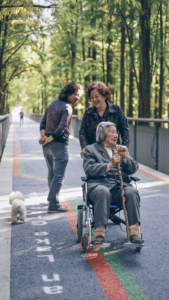Independence is a fundamental aspect of a fulfilling life, and its significance only amplifies as individuals age. Senior adults, in particular, face unique challenges as they navigate through a stage of life where chronic health conditions, disabilities, mobility issues, and cognitive impairment become more prevalent.
The journey of aging can, unfortunately, lead to a gradual erosion of independence, impacting mental well-being and identity.
In this guide, we explore practical ways to promote independence in aging loved ones while providing the necessary care and support.
Inclusive Decision-Making
A crucial step in preserving the independence of aging family members is involving them in decision-making processes. It’s essential not to assume that they are incapable of making choices. Instead, consider their preferences, opinions, and desires when making decisions that affect their lives. This inclusive approach not only maintains a sense of autonomy but also fosters a feeling of respect and dignity.
Combatting Loneliness Through Socialization

Loneliness can be a silent yet formidable adversary, particularly in the lives of seniors. As social circles may diminish due to various reasons, it’s imperative to actively encourage aging loved ones to socialize.
This could involve participating in community events, joining clubs or groups aligned with their interests, or even utilizing technology for virtual connections. Building and maintaining social connections not only alleviates loneliness but also contributes significantly to mental and emotional well-being.
Empowerment Through Engagement
Empowering aging individuals involves ensuring they actively engage in activities that bring them joy and fulfillment. Whether it’s pursuing hobbies, volunteering, or learning new skills, maintaining a sense of purpose is crucial for mental health.
Providing opportunities for them to take control of their lives, even in small ways, contributes to a positive self-image and helps counteract feelings of helplessness.
Adapt and Accommodate
Adapting the living environment to cater to the specific needs of aging individuals is an essential aspect of promoting independence. This may include making modifications to the home to enhance accessibility, providing assistive devices, or arranging for in-home support services.
Creating a living space that accommodates their evolving needs allows seniors to navigate their surroundings with confidence and independence.
By actively incorporating these strategies into caregiving routines, we can ensure that the elderly maintain a sense of autonomy, positively impacting their mental and emotional well-being.
Recognizing the importance of independence in the aging process not only enhances their quality of life but also contributes to a more compassionate and supportive community for our seniors.
Ready to provide your aging loved ones with compassionate in-home care?
Get expert caregiving services at King’s Grace Homecare.
Our team of qualified in-home caregivers has over a decade of experience providing expert caregiving services, including structured family caregiving and personal care for TBI patients.
Reach out to us today to learn more about our caregiver agency.


